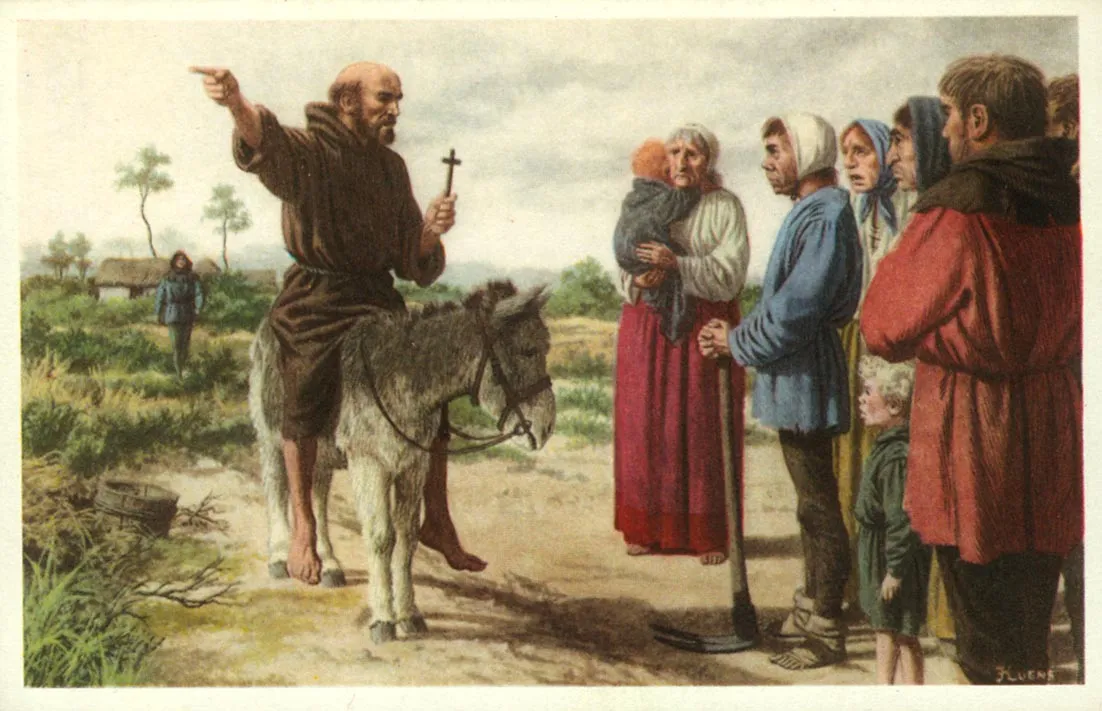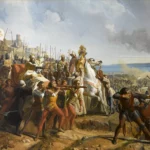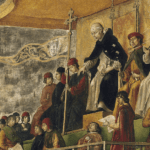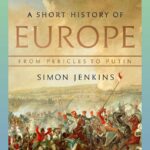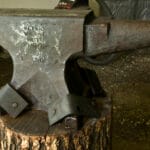Journey back to the Middle Ages, a time of great upheaval and religious fervor. Amidst this tumultuous era arose a figure known as Peter the Hermit, a monk whose impassioned pleas for a holy war ignited the First Crusade and forever altered the course of history. This is the story of the man who, with burning zeal, rallied a continent and set in motion one of history’s most fascinating and controversial chapters.
Peter the Hermit: The Catalyst of a Holy War
The Crusades, those epic expeditions to the Holy Land, were sparked in no small part by the fiery sermons of Peter the Hermit. A man of deep religious conviction, Peter dedicated his life to his faith, embracing a life of simplicity and spiritual devotion. While his early life remains shrouded in mystery, his impact on the era is undeniable.
Returning from a pilgrimage to Jerusalem, Peter was profoundly moved by the plight of Christians in the Holy Land. He embarked on a preaching tour across Europe, his words painting a vivid picture of their suffering and igniting a call to action. With a charisma that transcended social barriers, Peter’s message resonated with peasants and nobles alike, uniting them under the banner of faith.
This groundswell of religious fervor culminated in the People’s Crusade, a mass movement fueled by Peter’s powerful rhetoric and the raw faith of the common people. While the People’s Crusade ultimately ended in tragedy, its impact was undeniable. It served as a precursor to the official First Crusade, demonstrating the immense power of religious zeal in shaping the political landscape of the time.
Who Was Peter the Hermit?
Despite his pivotal role in igniting the First Crusade, Peter the Hermit remains an enigma. His origins are shrouded in uncertainty, with some accounts portraying him as a former soldier, while others depict him as a dedicated monk. What is clear, however, is his ability to captivate audiences and incite action.
Peter’s powerful sermons, delivered with unwavering conviction, tapped into the religious fervor of the time. His words resonated with people from all walks of life, fueling a desire to reclaim Jerusalem and ensure their place in the afterlife.
While Peter’s actions sparked the People’s Crusade, his exact role during the Crusade itself is unclear. Did he actively lead the charge, or did he take a more passive role? The historical record remains ambiguous, adding to the mystique surrounding this enigmatic figure.
What we do know is that Peter the Hermit left an indelible mark on history. His fiery rhetoric and the subsequent People’s Crusade exemplify the power of religious belief to shape political events and ignite conflict. Peter’s story continues to fascinate historians, sparking debate about his motivations and the lasting impact of his actions.
The People’s Crusade: Causes and Consequences
The People’s Crusade, a mass movement of unprecedented scale, was ignited by Peter the Hermit’s impassioned calls for the liberation of Jerusalem. Why did so many people heed his call, embarking on a perilous journey with uncertain outcomes?
What Drove the People’s Crusade?
Several factors contributed to the rise of the People’s Crusade:
- Religious Fervor: Peter’s vivid descriptions of the plight of Christians in the Holy Land struck a chord with deeply devout individuals. Answering his call was seen as a sacred duty, a chance to right a perceived wrong and secure their salvation.
- Apocalyptic Fears: The turn of the first millennium brought widespread anxieties about the end of the world. For many, joining the crusade offered a path to redemption and a guarantee of a place in heaven.
- Social and Economic Discontent: Life for many peasants in the Middle Ages was harsh, marked by poverty, famine, and limited opportunities. The crusade offered an escape, a chance for adventure, and the possibility of a better life in the East.
The People’s Crusade: Triumphs and Tragedies
While the People’s Crusade was born out of faith and conviction, it faced significant challenges:
- Lack of Military Preparedness: The crusader army, though vast in number, was largely comprised of commoners with little to no military training. Their lack of discipline and inadequate equipment made them vulnerable to attack.
- Logistical Nightmares: Moving such a massive group of people across vast distances proved a logistical nightmare. Food and water were scarce, disease spread rapidly, and attacks from hostile forces were a constant threat.
- Devastating Losses: The People’s Crusade suffered immense casualties. Many perished from hunger, disease, or in clashes with Turkish forces. Very few ever reached the Holy Land.
- Lasting Impact: The tragic outcome of the People’s Crusade cast a long shadow, raising doubts about the feasibility of such large-scale religious expeditions. Future crusades would grapple with the legacy of this ill-fated endeavor.
The Takeaway:
- Peter the Hermit’s powerful rhetoric, fueled by religious zeal, ignited the People’s Crusade.
- The crusade was a complex phenomenon, driven by a confluence of religious beliefs, social anxieties, and economic realities.
- Despite the strong faith that fueled the People’s Crusade, it was plagued by logistical challenges and ultimately met a tragic end.
- The legacy of the People’s Crusade, with its triumphs and tragedies, would shape the course of future crusades and leave an indelible mark on history.
Want to learn More? Check This Out:
- Asbridge, T. (2004). The First Crusade: A New History. Simon & Schuster.
Peter the Hermit’s Legacy: Myth and Reality
Peter the Hermit’s fiery sermons ignited a movement that swept across Europe, making him a pivotal figure in the First Crusade. His ability to mobilize thousands, from humble peasants to wealthy nobles, speaks volumes about the power of his message and the anxieties of the time.
While Peter’s role in sparking the People’s Crusade is undeniable, his background and motivations remain subjects of debate. Was he a devout man driven by genuine religious conviction, or were his actions influenced by more earthly ambitions? The historical record offers no definitive answers, adding to the mystique surrounding this enigmatic figure.
The People’s Crusade, though ultimately a failure, highlighted both the power and the perils of religious zeal. The crusaders’ unwavering faith, though commendable, was no match for the harsh realities of warfare and the logistical challenges they faced.
Centuries later, Peter the Hermit’s legacy continues to fascinate and intrigue. He is remembered as both a catalyst for change and a cautionary tale, a reminder of the profound influence of religious belief and the devastating consequences of unchecked fanaticism. His story, much like the First Crusade itself, is a complex tapestry of faith, ambition, and tragedy that continues to shape our understanding of this pivotal period in history.
Have you ever wondered how old is Peter Noone of the Herman’s Hermits? Well, now you can find out! Click the link to learn more about the legendary singer and his iconic band.
- Unveiling Bernhard Caesar Einstein’s Scientific Achievements: A Legacy in Engineering - July 15, 2025
- Uncover who is Jerry McSorley: CEO, Family Man, Business Success Story - July 15, 2025
- Discover Bernhard Caesar Einstein’s Scientific Contributions: Unveiling a Legacy Beyond Einstein - July 15, 2025
